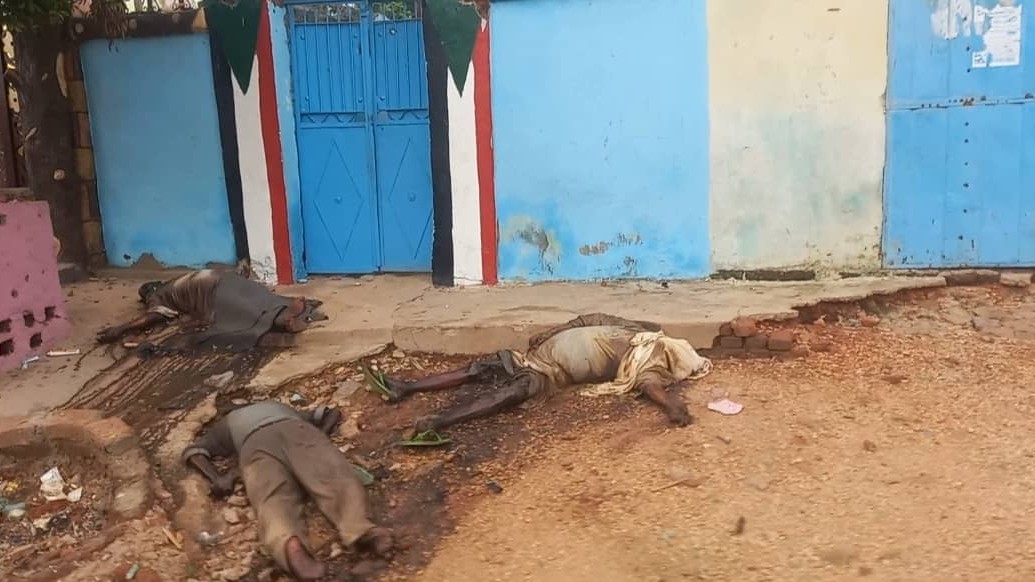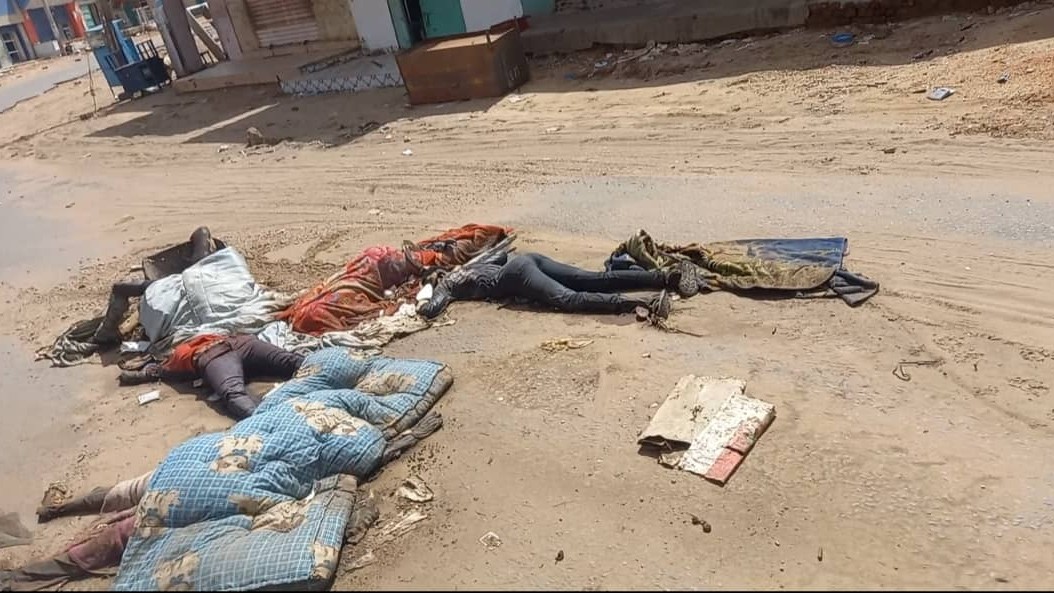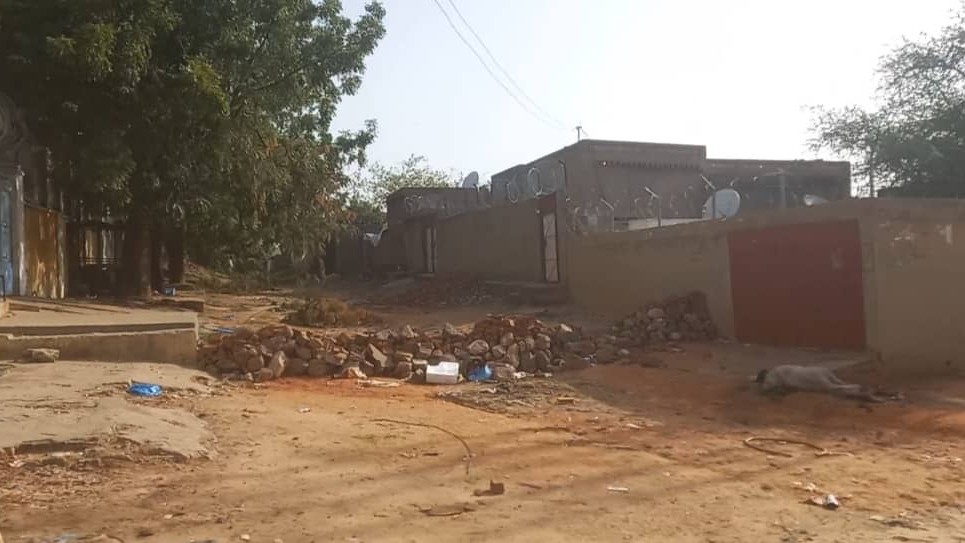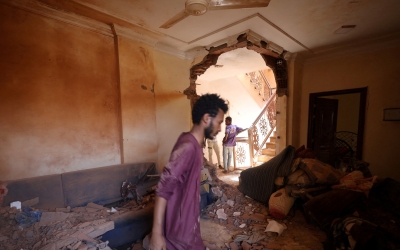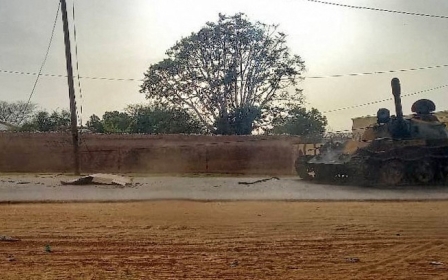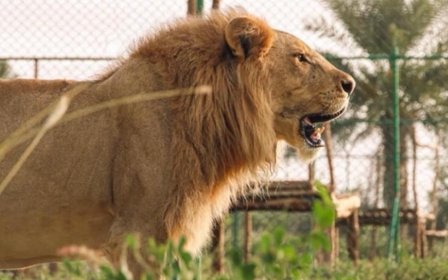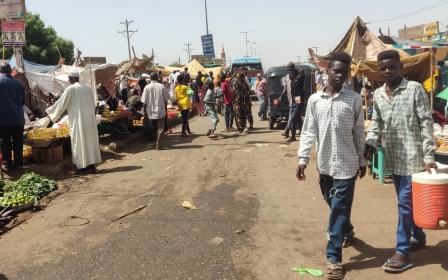Sudan: I fled the horrors of Darfur. This is what I saw
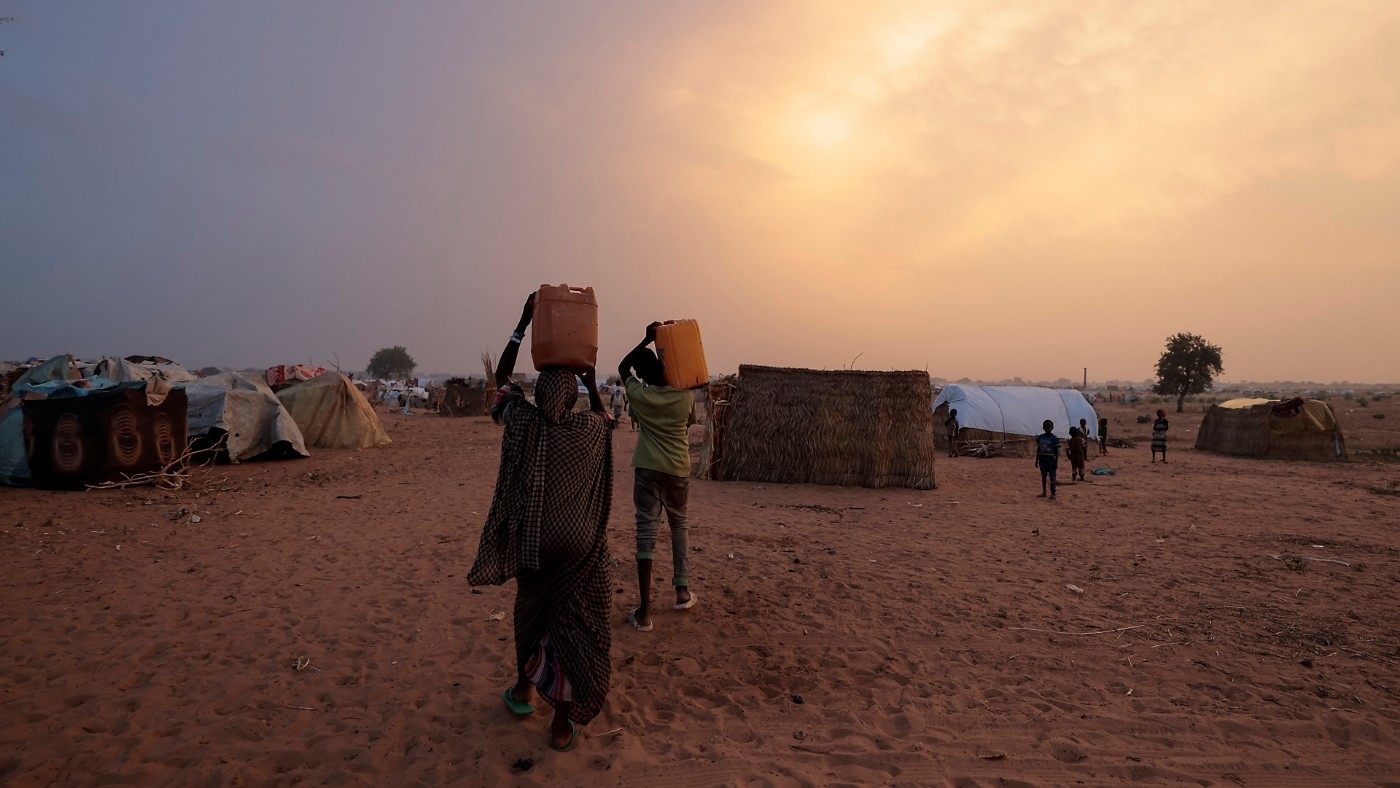
Editor's note: This article contains graphic and distressing images.
War broke out in Sudan on 15 April and then spread to the vast western region of Darfur days later.
Across Darfur's five states, the conflict between the Sudanese army and the paramilitary Rapid Support Forces (RSF) has ignited ethnic divisions, with the RSF and allied Arab militias targeting the local non-Arab Massalit community.
El-Geneina, the capital of West Darfur, has been the site of manifold horrors, with mass killings taking place and bodies left lying in the streets. The RSF and aligned militias are believed to control 80 percent of the city, while hundreds of thousands of people have fled to neighbouring Chad.
Idriss, a 29-year-old documenter of human rights abuses, was one of those people who fled. He is now in Nairobi, and retells his story, preferring to remain anonymous for security reasons.
It it is illustrated with exclusive photos provided by him, which contain sensitive content and should be viewed with caution.
As told to Nadda Osman and Oscar Rickett.
The storm comes west
I was sitting in a cafe with some friends when the news came to us.
Throughout Sudan's history, war has often meant Darfur. I remember, when I was a child in 2003, moving house with fighting all around us, and I remember that my school was closed for two years.
This time, the fighting began in the capital Khartoum, but we knew it would reach us. We talked about how the situation here in el-Geneina, where I was born and raised, would be different. We talked about how it would be difficult. Very difficult.
On 22 April, el-Geneina was surrounded on all sides by armed Arab miltias aligned to the RSF. Two days later, we woke up at 7am to the sound of gunfire. We went out onto the streets to find the militias everywhere. Bullets sprayed all around me. Wherever I looked, there was fighting.
Armoured cars came out onto the streets and I went back home. The fighting continued for hours. I could hear the sound of live fire and there was talk of a weapons warehouse, which had been broken into and looted.
On that day, we were all trapped in our homes until the evening. In the streets, I could see police and army officers holding M16 rifles, Kalashnikovs and rocket-propelled grenades (RPGs).
As the days went on, the attacks continued and the weapons got bigger and more advanced. The RSF and the militias aligned to it were carrying out daily attacks across the city.
In response, the army was shelling randomly and some of its soldiers were rebelling. The militias were also out of control, shelling people without any discernible plan and firing bullets in an uncontrolled way.
Not long after those first days of war, I would see homes, cars and open-air markets looted. And then the city began to run out of water.
Women and children would leave their homes to get water, but were targeted and shot dead, so eventually people were too afraid to go out and get water.
Food began to run out quickly too. Some shopkeepers would let us take what we wanted, while others recorded our names so we could pay later on.
The situation was very difficult though, and for days we went without eating. The only food we could get our hands on was pasta and flour. The meal most families relied on was aseeda, which is cooked with dough. There were no other options.
Witnessing mass murder
On 14 June, the governor of West Darfur, Khamis Abdullah Abakar, was murdered. Hours before his death, he had hit out at the RSF, accusing them of being behind the ongoing violence and describing it as "genocide".
For most people in el-Geneina - and for many international monitors - it was clear the paramilitary had captured and killed him. The RSF deny this.
The next day, there was an attack on my neighbourhood. My mother is Massalit and the neighbourhood is majority Massalit. It is our community that the RSF and its allied militias have mostly been targeting.
Every day I would hear about the death of someone I knew
The video of the governor's killing was spreading. People were trying to flee el-Geneina, hoping to travel from the south of the city, where I lived, to the Ardamta area in the north, where the army command is.
From there, they would continue on their journey to Chad and the border town of Adre, a journey fraught with peril despite it being just 30km.
I was out in the street when they arrived. Men in dark uniforms riding in armoured cars and technicals. Toyoto Land Cruisers with the top half of the cabin sawed off. It had to be the RSF. Already, they had been entering people's houses and killing them.
There were many others around me, my neighbours, most of them planning to leave the city for Chad. The fighters grabbed people in the street, separating the men from the women and asking them, "Are you Massalit? Where do the Massalit live?"
After they had sorted through the men, they fired directly at some of them. They killed eight of them, including two elderly people. Some managed to escape but the rest they tied up and took away in their cars.
I saw all this happening but I wasn't at the front of the group of people watching. The fighters started shooting at us and we ran away.
There were a lot of people killed in mid-June and this was not the only mass murder I witnessed. Every day, I would see six or seven dead bodies lying in the streets. On 20 June, the Sultan of the Massalit said that more than 5,000 civilians had been killed in el-Geneina between 24 April and 12 June.
In my neighbourhood, people would wait until there was a one or two-hour break in fighting, and then they would come out and quickly remove the dead bodies to bury them.
But not everyone could find their loved ones. Not everybody had someone looking for them. And so the bodies piled up and began to rot as they were left in the roads.
The situation was very tense. I was filled with anxiety. There would be a period of relative quiet for one or two days and we would think that maybe, this time, the fighting would stop. Then it would intensify and continue.
We were also being targeted because of our skin colour: there were certain areas you couldn't walk in if you're black (like me) and certain areas lighter-skinned people couldn't walk in.
Family members killed
Every day I would hear about the death of someone I knew. People got daily phone calls letting them know that a relative, friend or parent had been killed.
I lost many relatives. A group of family members on my mother's side were killed in al-Madaris, a neighbourhood of el-Geneina.
Soon there was no electricity and no internet connection. We were completely isolated
It was traumatising. Widespread panic had gripped the city. I would find out that someone had been killed, then minutes later get a call about the death of someone else.
I started to feel very afraid. I couldn't stop sweating.
There were no ambulances or medical services, and young men were being targeted every time they left their homes. The attacks were taking place everywhere. There were heavy assaults on schools - which weren't operating anymore - and on markets, which were still running.
Soon there was no electricity and no internet connection. We were completely isolated. There was no way to know where your friends or family were. We would wake up at five in the morning to go to someone’s house and ask them for any information, or to see if they knew what was going on.
We were living in the dark. I would hear the sound of a major clash or attack, but there was no way to find out what had just happened, and if there were casualties, there was no way to treat them and no one to treat them. Many people around me died because they could not get treatment for their injuries.
Everyone was terrified. One man’s son would not stop crying for days. He just kept on crying, the tears streaming down his face. It was very difficult to see everyone crying, everyone suffering so badly.
On 18 June, I decided to leave el-Geneina, the city I am from, the place I grew up. A massacre had taken place on 15 June and I knew I needed to get out.
My journey to Chad wasn't easy. With young men being targeted in the streets, I went directly to a safehouse once I had left home. A bunch of of us - all young people - found an armed Arab group that was taking people to the border. You just had to pay them.
I passed through more then 10 checkpoints, where I was searched and asked questions by armed officers. They wanted to know which tribe I'm from, where I lived and if I was Massalit.
I saw people’s phones and money being taken, and I saw armed children at the checkpoints. In times of peace, the journey takes about an hour, but this time it took many, many hours as they searched us at the checkpoints. People were attacked there too and I saw bodies piled up on the floor at these checkpoints.

We were greeted at the border by the Chadian army. Before they would let me through they took my name down. We were given numbers and our names were recorded by charities such as UNHCR before we were given a tent to stay in.
It was really difficult. Some tents had nine members of one family in them, but whatever the situation, it was better than what we were escaping in el-Geneina.
Hundreds of thousands of Sudanese have crossed the border into Chad and the strain on resources means that those who came after me faced more difficulties. Bread and oil was distributed to families but it was depleting fast.
Telling the world
I knew that there was no hope for the situation in el-Geneina to be fixed, but I had to document what was going on.
I made the decision to post some of what I had seen happening in my hometown on Facebook because I felt that it was important to shed light on what was happening. I felt - and still feel - like it is being ignored, that it is going unnoticed, that atrocities are taking place in the dark.
One of the photos I posted online of the dead bodies caused me a lot of trouble. People who were still left behind in el-Genina sent me messages on Facebook saying they had been threatened because of it.
There are powerful people who don't want the world to know what is happening in our home.
Soon, because of what I was posting online, Chad no longer felt safe to me. I was starting to hear of many people being killed because they were related to activists or people working in human rights, and the area I was in was small, so I couldn’t remain there for long anymore.
Since no one knew what was going on in el-Geneina, I wanted to use my social media to inform people, even though I was reluctant to, but the media was also not covering the matter properly because of the lack of internet and phone connection.
I wanted to put pressure on the Rapid Support Forces and show the world the atrocities that were happening, even though it put my life in direct danger.
About a week ago, I decided to leave Chad and make my way to Nairobi.
Life is difficult here, and I am worried about my family, who are still in el-Geneina.
The war continues there. Armed forces from any side could easily break into and raid our home, or it could be hit by the heavy shelling, which continues at random. Life has become a hell there.
Even in Nairobi, I don’t feel completely safe. Life is expensive and I have no real plans, beyond trying to find some kind of scholarship or opportunity.
I didn't want to leave el-Geneina, but then I saw the dead bodies, the road, the ruins. Now I think maybe I'll never return. I think this war will last.
But my family is still in Darfur. For now, they are safe. One day, I will go back.
Middle East Eye propose une couverture et une analyse indépendantes et incomparables du Moyen-Orient, de l’Afrique du Nord et d’autres régions du monde. Pour en savoir plus sur la reprise de ce contenu et les frais qui s’appliquent, veuillez remplir ce formulaire [en anglais]. Pour en savoir plus sur MEE, cliquez ici [en anglais].


